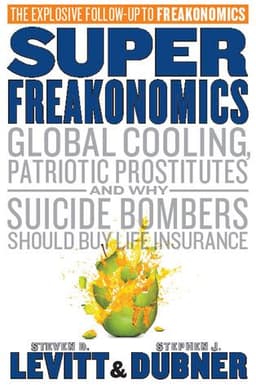
Super Freakonomics - 1 Minute Summary
Global Cooling, Patriotic Prostitutes And Why Suicide Bombers Should Buy Life Insurance
Book by Steven D. Levitt , Stephen J. Dubner
Read the In-Depth 15 Minute Summary
Thinking Like a Freak: Insights from Superfreakonomics
In their provocative book Superfreakonomics, economist Steven D. Levitt and journalist Stephen J. Dubner challenge readers to question conventional wisdom and think like a "freak", which involves a willingness to follow data, consider unorthodox solutions, and challenge entrenched beliefs. Drawing on principles from economics and beyond, they explore a wide range of surprising real-world phenomena, from the hidden economics of prostitution to the unintended consequences of car seats.
One key theme of Superfreakonomics is the power of incentives to shape behavior. The authors argue that understanding the incentives at play in any situation is crucial for crafting effective policies and making good decisions. For example, they show how misaligned incentives help explain why some doctors fail to wash their hands regularly, contributing to deadly hospital-acquired infections. By redesigning incentives, hospitals have boosted hand hygiene compliance and saved lives. Similarly, the book explores how creative incentives could encourage more organ donation, fight global warming, and prevent terrorism.
Another central lesson of Superfreakonomics is the importance of data-driven decision making. Levitt and Dubner repeatedly show how relying on anecdotes, intuition, or conventional wisdom can lead us astray. For instance, they argue that the famous story of Kitty Genovese's murder and the "bystander effect" is largely a myth unsupported by the actual evidence. They also challenge the notion that child car seats are safer than regular seatbelts, citing crash test data showing little difference in mortality risk. By digging into the numbers and running experiments, the authors demonstrate how an empirical mindset can overturn long-held beliefs.
Throughout the book, Levitt and Dubner highlight the value of thinking creatively and considering unorthodox solutions. They profile researchers and entrepreneurs who have tackled big problems by reframing them in novel ways. For example, one team of scientists has proposed fighting global warming with geoengineering techniques like pumping sulfur dioxide into the atmosphere or brightening marine clouds to reflect more sunlight. While controversial, these ideas illustrate how expanding the solution space can open up new possibilities. The authors argue that we should resist the urge to dismiss "repugnant" ideas prematurely and instead evaluate them on their merits.
Ultimately, Superfreakonomics encourages readers to cultivate a mindset of curiosity, empiricism, and creative problem-solving. By following the data, questioning assumptions, and thinking like a freak, we can uncover surprising truths and devise more effective solutions in our own lives and careers. Whether you're a business leader, policymaker, or simply a curious citizen, the book offers valuable tools for making sense of a complex world. The next time you face a tough challenge, try asking yourself, "What would a freak do?" The answer might just surprise you.

